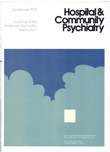Community Residential Treatment for Schizophrenia: Two-Year Follow-up
Abstract
Two-year outcome data from a study comparing two kinds of treatment given similar groups of young, newly diagnosed, unmarried schizophrenic patients deemed in need of hospitalization are reported. The experimental program, Soteria, is a nonmedical, psychosocial program with minimal use of antipsychotic drugs; it is staffed by nonprofessionals and located in a home in the community. The control program is a short-stay, crisisoriented inpatient service in a community mental health center where neuroleptic drugs are the principal treatment. The experimental group had significantly longer initial stays, and only 8 per cent received neuroleptics during their initial admission. Over the two-year follow-up period, there were no significant differences between the groups in readmissions or levels of symptomatology. However, experimental subjects significantly less often received medications, used less outpatient care, showed significantly better occupational levels, and were more able to live independently.
Access content
To read the fulltext, please use one of the options below to sign in or purchase access.- Personal login
- Institutional Login
- Sign in via OpenAthens
- Register for access
-
Please login/register if you wish to pair your device and check access availability.
Not a subscriber?
PsychiatryOnline subscription options offer access to the DSM-5 library, books, journals, CME, and patient resources. This all-in-one virtual library provides psychiatrists and mental health professionals with key resources for diagnosis, treatment, research, and professional development.
Need more help? PsychiatryOnline Customer Service may be reached by emailing [email protected] or by calling 800-368-5777 (in the U.S.) or 703-907-7322 (outside the U.S.).



